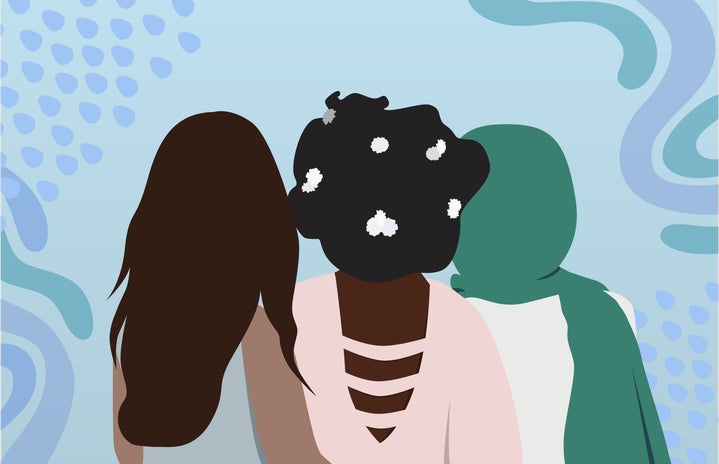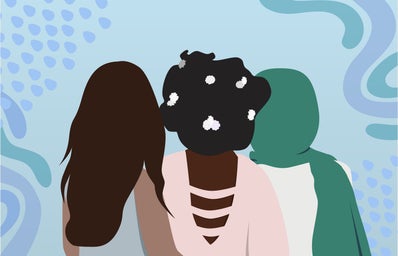TW: Suicide ideation and depression
Note: I will refer to ‘chronic illness and/or disability under the same umbrella of ‘disability’, as having a chronic illness can be classed as one due to it being a huge impairment making it more difficult than the average person to partake in certain activities and interact with the world due to our restrictions.
I will go straight to the point. Being diagnosed with a disability is traumatising, living with one is isolating and trying to accept you have one is exhausting. You learn so much whilst having a disability, both subconsciously through constantly fighting through the pain and actively through advocating in the ableist world we live in. You start seeing things in a completely different light, where the smallest of things mean nothing, the most excruciating pain is no longer unbearable and sometimes you just want time to freeze. Whilst a disability can be diagnosed at any age, if you are diagnosed younger, it completely changes your childhood. It takes away a large part of being able to have fun as a child, not being able to do the same activities as your peers. You spend a lot of time wondering the ‘what if’s’ on what could have been, often things people do not have to worry about. And you have to grow up so much quicker, to have some sort of independence, to have some sort of control, to have some sort of life.
Living with a disability can severely impact your mental health. The trauma that comes hand-in-hand is something often too difficult to express. It can often be insufferable, where the bad sometimes drowns out the good and your mind is your most torturous enemy. I wish I could say it gets easier, but I can’t promise that. There will be days I feel fabulous, can rule the world, where I have so much energy I feel somewhat ‘normal’. But the complete opposite is scary, where it comes at any point, lingering in your mind as you constantly battle it in the hopes it would go away. We might not always show it, but most individuals within the disabled community have struggled with their mental health in some way or another. It’s normal to struggle with your mental health when constantly dealing with diagnoses, disappointments and depressed states. But we still have to get up despite the pain, the trauma, the disability. Sometimes, we even cover it with a mask to pretend we are okay, to hide how we are truly feeling so we can seem somewhat ‘normal’.
I interviewed some of my lovely and supportive friends in the disability community, asking them about how such a lingering thing can impact their mental health. All of these wonderful people commit time to advocacy, fighting for our rights, discussing various perspectives and breaking stereotypes. Hearing how other people within the disability community discuss these topics is different from talking about it with your loved ones. Knowing other people feel similar baggage, think relatable thoughts and go through resembling days can make it feel slightly less isolating. Whilst I can talk about my own experience, I feel it is also important to talk of others. So I’ve collected responses asking disabled individuals how their disability has impacted their mental health.
Nia (@the_chronic_notebook): I couldn’t really pull apart or understand the ways it was affecting me for a long time. I used to hide all my feelings about it, never talk to anyone, pretend I wasn’t sick because I thought that made me more palatable to others and avoided awkward conversations. I didn’t realise how much that was harming me for a long time.
I’ve been chronically ill for seven years, but I still feel the same anxieties, grief, sadness and frustration I did years ago. I become anxious about pain levels, the future, new medications, doctors’ appointments, and making plans with illness. I’m frustrated when I can’t do the things I had planned or wanted to, or when I have to pause because my symptoms are flaring, while everyone else around me can keep going. I’m deeply sad often about things I’ve lost, the grief over the opportunities, memories and life you missed out on. I’ve been able to navigate these feelings better over time, but it is difficult, especially when mental health care and services for the chronically ill and disabled are lacking a lot.
Iman (@alilbitofaith): I feel more confident, comfortable, and less ashamed of being my disabled chronically ill self. I feel less alone and that helps me feel less isolated at home knowing I have people who relate and understand. There is also a lot of grief knowing what many of us are going through. The pain, ignorance, and ableism, gets to you. Sometimes I have to step back to focus on my personal mental health before speaking up. I have to care for myself before being able to be there for others.
Lauren (@buttyoudontlooksick): I have developed a PTSD trauma experience from a past traumatic experience in the hospital giving birth and I am not the same after this. I’ve gone through therapy specifically for it. Becoming chronically ill is a lot for anyone to handle. My anxiety is 10 times worse, any new symptom makes me question, google, stress… I never was like that before.
Ali (@cominghomechronicles): Starting from a young age, my GI issues skewed my relationship with food and my body. This made me extra vulnerable to developing an eating disorder, which I later did. Being dismissed and gaslit for the first few years by doctors, medical professionals, family members, and friends really, really affected me. The last three years have been riddled by “little traumas” which accumulated to being something very hard to deal with.
I question and belittle every symptom I have. I question my need for a feeding tube every single day. After being told for years it was in my head, I am consistently convinced if I just try harder, I can control my symptoms. It is very hard to be connected to my body when I was told for years my perception of it was wrong. It’s hard to believe myself when people have told me for years I was exaggerating or faking. Additionally, the anxiety from seeing new doctors or having to undergo new tests is something I can’t quite describe.
Eli (@elimodiah): I often worry I’m not doing enough for our community, but ultimately I think I just put too much pressure on myself when it comes to social media. I focus too much on how I’m showing up instead of just showing up at all, and I think that’s something I’ll be working on in the future.
Olivia (@livwiththepain): It’s been a rough road with my mental health. I have long term situational depression surrounding my illnesses. I’ve tried so many antidepressants and have yet to find one that really works for me. At my lowest points, I didn’t want to live through the pain anymore. I had thoughts of, “Am I truly meant for this life when I’m not able to even live it.” It got to a point where I was taking extra medication when I shouldn’t have, because I just didn’t care if I woke up the next day. It’s been really hard, I’ve been so depressed before that I’ve stopped taking care of myself. I still struggle to get back into a routine of self-care. Most days it’s a fight to even brush my teeth. It causes a lot of pain to hold a toothbrush. It costs too much energy to take a shower very often. And there are days where fighting with your body to do something so simple just isn’t worth it.
…
Whilst all of us have our own journey when it comes to mental health, it’s not all horrific. Spending so much time alone with your thoughts, constantly thinking the worst, feeling the worst and being told the worst can really get to you. But it also teaches you things. You learn to live with the constant fatigue not just physically, but mentally. You learn to deal with the fear of hospital visits, anxiety of possible diagnoses and sadness of accepting people will never understand how you are truly feeling. And sometimes, you stop seeking answers.
…
Nia (@the_chronic_notebook): There are times when mentally I’m not struggling so much, but times where I am. It really comes in ebs and waves. These feelings are still going to stay with you in many ways and they are understandable and make sense based on everything you experience. Validating your own feelings, talking to people who understand, therapy, and little activities that bring you joy all help.
Ali (@cominghomechronicles): This journey is not one bit glorious, but I can also recognize my own mental growth while walking this journey). When I started getting sick, I had to learn how to care for my body because no one else would. I had to learn to advocate for it. And there was something very healing about suddenly having to listen and respond to my body’s unique needs after I had spent years with my eating disorder fighting it. I still don’t understand my body and question my perception of it, but I do care for it. I try to listen. I fought so doctors would see the pain my body was in, and help it. And all of that has been healing. Strangely, I have a much better relationship with my body now than I did prior to my illnesses.
…
Having people around you who are supportive and caring can greatly improve your mental health and I truly believe that. Whilst I still have my down, overbearing days, most of my days are wonderful due to the support network that gives me more reason to fight. I’ve accepted most of my days will be spent being chronically fatigued, with low energy and the lingering feeling my disability will always be there, but my wonderful support network reminds me every day I can be vulnerable mentally if I want to. And it does not change how much they love me. Whilst they may never understand what it is like deep down, it is them I have to thank for allowing me to have a safe space to talk about my mental (and physical state), reminding me they truly want to be there, even though the horrible parts of having a disability, which includes the impact it has on our mental health.


